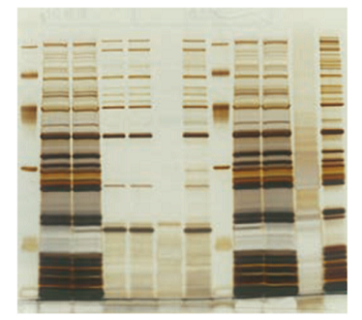Gel Stain Reagents (Silver Staining)
This reagents stain proteins in gel with silver after electrophoresis (PAGE). Compared with Coomassie Brilliant Blue (CBB) staining, high sensitive staining can be done. Depending on the staining / destaining times, they detect a few nanograms level of protein.
Principles
Silver ions are considered to combine selectively to proteins at specific constituents such as sulfhydryl (-SH), amino (-NH2), hydroxyl (-OH), and carboxyl (-COOH) groups, especially at the sulfhydryl group. This is because an acid-mediated conformational change in the protein exposes the sulfhydryl binding, making the sulfhydryl group more reactive with silver ions than the other groups. Consequently, silver ions complexed with ammonium ions in the reagent combine with proteins by substituting the sulfhydryl groups of the protein with ammonium ions.
Silver Stain 2 Kit wako
Silver Stain 2 Kit wako is a general silver staining kit staining protein bands in approximately 70 minutes. The staining density can be freely adjusted with the included stopping solution.

Sample: E. coli crude extract
Kit composition
100 mL each x 1
- Fixative stock solution (methanol, acetic acid)
- Enhancing stock solution (dithiothreitol, glutaraldehyde)
- Staining solution A (silver nitrate)
- Staining solution B (ammonia, sodium hydroxide)
- Developer stock solution (formaldehyde, citric acid)
- Stop solution (citric acid)
Silver Stain MS Kit
Silver Stain MS Kit is a silver staining kit optimized for mass spectrometry. Conventional silver staining kits are not suitable for mass spectrometry, because glutaraldehyde in the enhancer cross-links amino groups, thus reducing the efficiency of in-gel digestion. This product is glutaraldehyde-free and is effective for mass spectrometry. In addition to mass spectrometry, it is useful for staining after SDS-PAGE due to its higher sensitivity. A destaining solution, which is used after band excision, is also included.
Kit composition
- Enhancing stock solution: 200 mL
- Staining stock solution: 200 mL
- Developing stock solution: 100 mL
- Developing powder: 20 g
- Stop Solution: 200 mL
- Destaining solution A: 50 mL
- Destaining solution B: 50 mL
Application Data
Rabbit phosphorylase was separated by SDS-PAGE and stained using the Silver Stain MS Kit. After staining, the bands were excised and digested with trypsin in gel for MALDI-TOF/MS.

Data Source:Dr. Yoshinao Wada, Osaka Women's and Children's Hospital
Table for kit comparison
| Operating procedure | Composition | Silver Staining Kit | |
|---|---|---|---|
| Ⅱ | MS | ||
| Glutaraldehyde | Contained | Not contained | |
| Gel after SDS-PAGE | |||
| ↓ | |||
| 1.Fixation-1 | Fixative solution-1*1 | 10 min | 20 min |
| ↓ | ↓ | ↓ | |
| 2.Fixation-2 | Fixative solution-2*1 | 10 min | 10 min |
| ↓ | ↓ | ||
| 3.Washing with water | (Deionized water) | ↓ | 10 min |
| ↓ | ↓ | ||
| 4.Enhancement | Enhancing solution | 10 min | 1 min |
| ↓ | ↓ | ↓ | |
| 5.Washing with water | (Deionized water) | 5 min | 1 min × 2 |
| ↓ | ↓ | ↓ | |
| 6.Silver staining | Staining solution | 15 min | 20 min |
| ↓ | ↓ | ↓ | |
| 7.Washing with water | (Deionized water) | 2 to 5 min × 3 | 1 min x 2 |
| ↓ | ↓ | ↓ | |
| 8.Development | Developing solution | 5 min | 3~10 min |
| ↓ | ↓ | ↓ | |
| 9.Stopping development | Stop solution | 2~3 min | 1 min |
| ↓ | ↓ | ↓ | |
| 10.Washing with water | (Ionized water) | 2 min x 3 | 1 min x 3 |
| Total time | Approximately 70min | Approximately 70 min | |
| Gel excision*2 | ↓ | ||
| 11.Destaining | 15 min | ||
| ↓ | |||
| In-gel digestion*3 | |||
| ↓ | |||
| Mass spectrometry | |||
- *1 As this fixative solution is not included among the constituent reagents, you will need to prepare it yourself.
- *2 A brown fraction is excised.
- *3 The following reagents are commercially available as in-gel digestion enzymes for proteome research:
Product Number: 125-05061 Lysyl endopeptidase, mass spectrometry grade 20 μg × 5
Product Number: 202-15951 Trypsin, porcine pancreas-derived, mass spectrometry grade 20 μg × 5
Product List
- Open All
- Close All
For research use or further manufacturing use only. Not for use in diagnostic procedures.
Product content may differ from the actual image due to minor specification changes etc.
If the revision of product standards and packaging standards has been made, there is a case where the actual product specifications and images are different.



